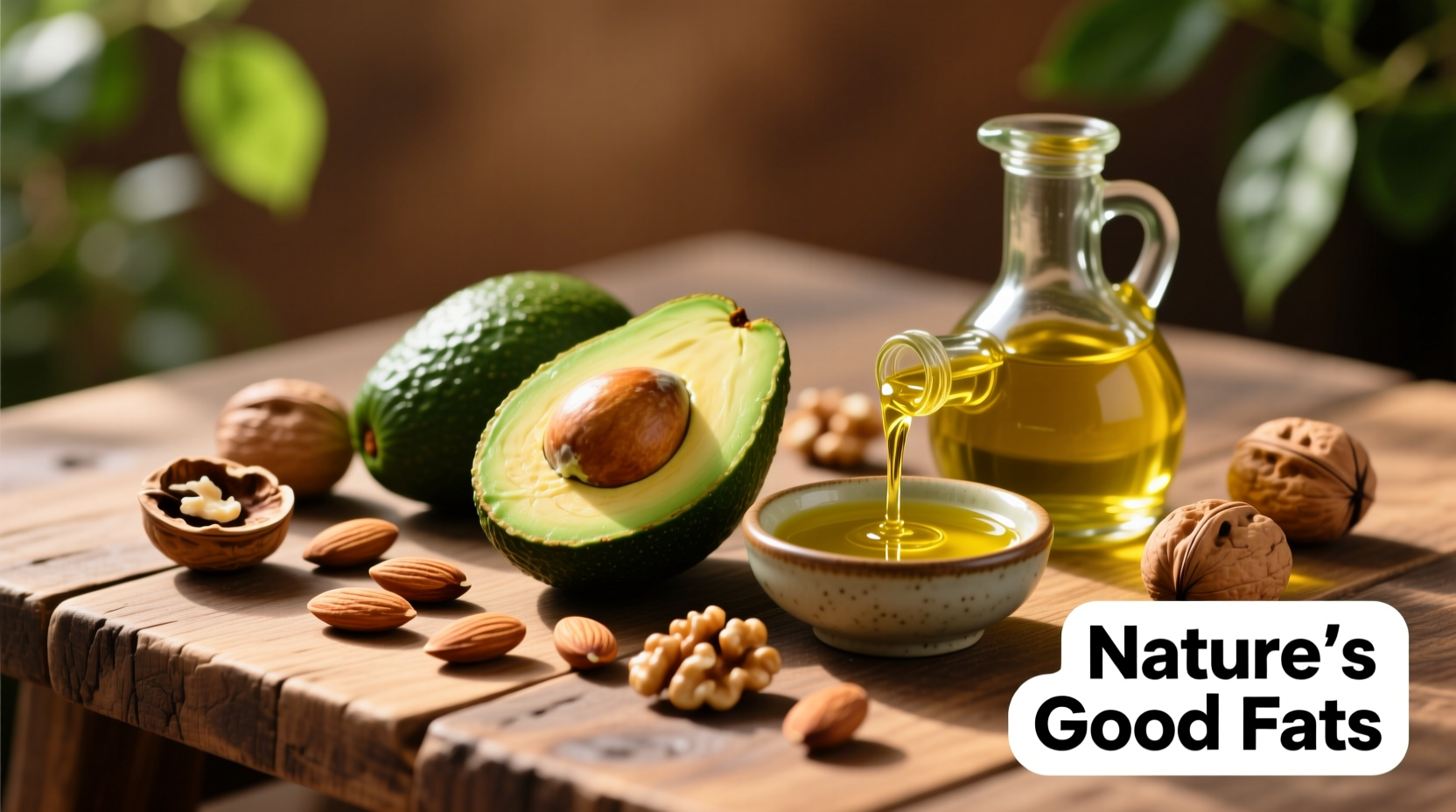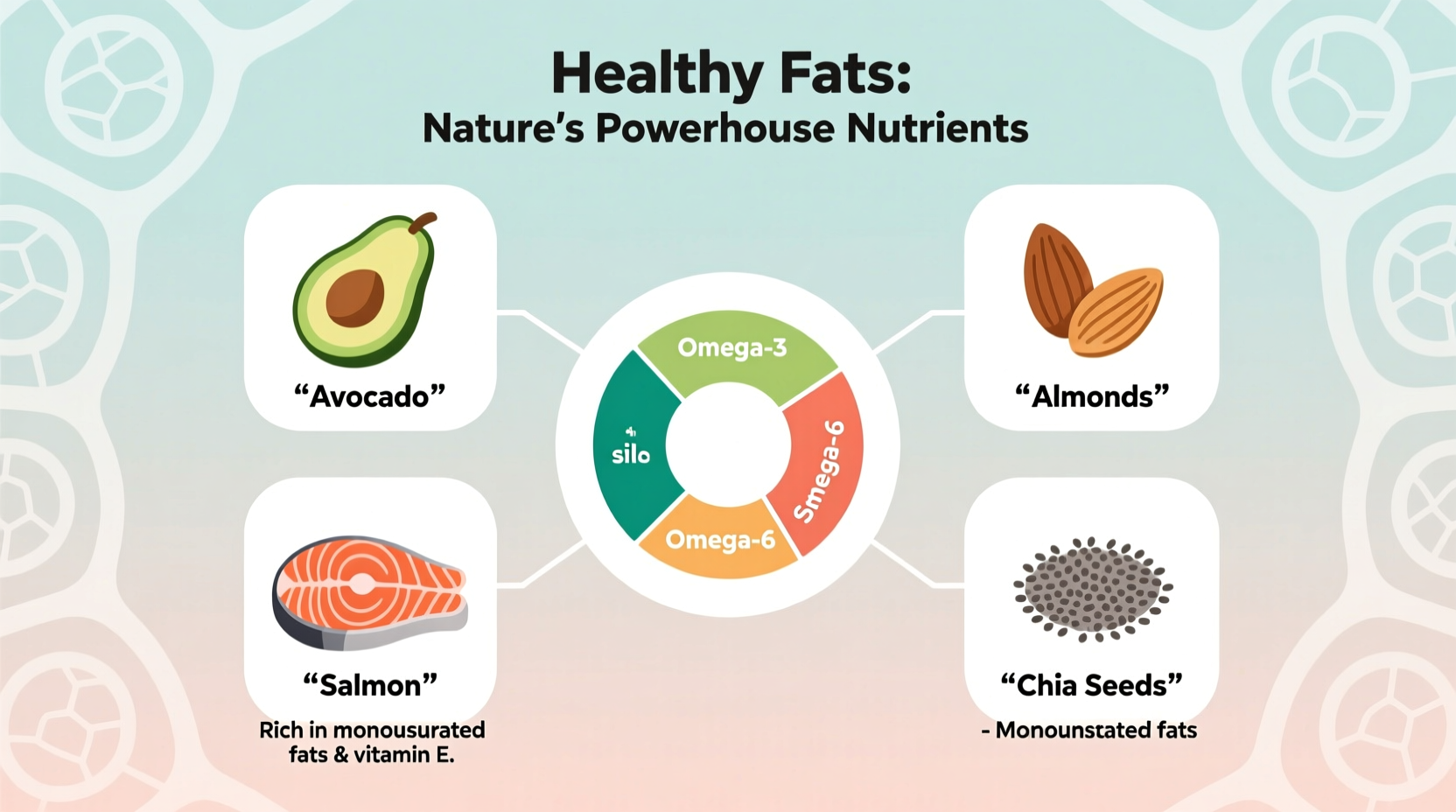Understanding which fats truly benefit your health can transform your nutritional choices. As a culinary professional with extensive experience in food chemistry, I've seen how the right fats elevate both flavor and wellbeing. This guide cuts through the confusion with evidence-based recommendations you can trust and implement immediately.
Why Healthy Fats Are Essential for Your Body
Contrary to outdated dietary myths, certain fats are crucial for optimal health. Healthy fats serve as building blocks for cell membranes, help absorb fat-soluble vitamins (A, D, E, K), and provide sustained energy. The American Heart Association confirms that replacing saturated fats with unsaturated varieties significantly reduces cardiovascular disease risk.
Monounsaturated and polyunsaturated fats—particularly omega-3 fatty acids—offer remarkable benefits:
- Reduce inflammation throughout the body
- Improve cholesterol profiles by lowering LDL ("bad" cholesterol)
- Support brain health and cognitive function
- Enhance nutrient absorption from other foods
Your Complete Guide to Healthy Fat Food Sources
Not all high-fat foods deliver equal benefits. Here's what nutrition science reveals about the most valuable options:
Fatty Fish: The Omega-3 Powerhouses
Fatty fish stand as the premier source of EPA and DHA omega-3 fatty acids. The FDA recommends consuming 8-12 ounces of fatty fish weekly for optimal heart health. Wild-caught varieties typically contain higher omega-3 concentrations than farm-raised alternatives.
| Fish Type | Omega-3 Content (per 3oz) | Additional Benefits |
|---|---|---|
| Mackerel | 5,134 mg | Highest vitamin D content among seafood |
| Salmon | 1,716-2,260 mg | Natural astaxanthin antioxidant |
| Sardines | 1,363 mg | Rich in calcium from edible bones |
| Herring | 1,702 mg | Excellent selenium source |
Plant-Based Fat Sources: Nuts, Seeds, and Oils
For vegetarians, vegans, or those seeking variety, plant sources provide valuable monounsaturated and polyunsaturated fats. Note that plant-based omega-3s (ALA) require conversion to EPA/DHA in the body, making them less efficient than fish sources.

Avocados: The Versatile Superfood
One medium avocado delivers approximately 22 grams of monounsaturated fat along with 10+ essential nutrients. Research published in the Journal of the American Heart Association shows that replacing saturated fats with avocados significantly improves lipid profiles. Their creamy texture makes them ideal for:
- Creating dairy-free dressings and sauces
- Adding richness to smoothies
- Replacing mayonnaise in sandwiches
- Providing satiety in plant-based meals
Practical Ways to Incorporate Healthy Fats Daily
Transitioning to a healthy fat-rich diet doesn't require drastic changes. These simple strategies yield significant benefits:
Morning Nutrition Boosters
Add one tablespoon of chia seeds or ground flaxseed to your breakfast routine. These tiny seeds provide omega-3s and fiber that stabilize blood sugar throughout the morning. Studies from the National Institutes of Health demonstrate that daily flaxseed consumption reduces inflammation markers within just 12 weeks.
Smart Cooking Oil Swaps
Replace butter and tropical oils (coconut, palm) with extra virgin olive oil for low-to-medium heat cooking. The USDA Dietary Guidelines specifically recommend olive oil as a primary fat source due to its stability and heart-healthy compounds. Keep in mind that extra virgin olive oil has a lower smoke point (320°F) than refined varieties (465°F), making it unsuitable for high-heat frying.
Avoiding Common Healthy Fat Mistakes
Many well-intentioned eaters fall into these traps:
- Overconsumption: Healthy fats remain calorie-dense. Stick to recommended portions (1/4 avocado, small handful of nuts)
- Processing destroys benefits: Choose raw or dry-roasted nuts over honey-roasted or candy-coated varieties
- Storage errors: Keep nuts, seeds, and oils refrigerated to prevent oxidation
- Misunderstanding labels: "Fat-free" products often contain added sugars to compensate for flavor loss
Scientific Evidence Behind Healthy Fats
The Dietary Guidelines for Americans consistently emphasize replacing saturated fats with unsaturated alternatives. This recommendation stems from decades of research, including the landmark PREDIMED study published in The New England Journal of Medicine, which demonstrated a 30% reduction in cardiovascular events among participants following a Mediterranean diet rich in olive oil and nuts.
Government health agencies provide clear guidance:
- The American Heart Association recommends at least two 3.5-ounce servings of fatty fish weekly
- The Dietary Guidelines for Americans 2020-2025 advise replacing solid fats with oils whenever possible
- The National Heart, Lung, and Blood Institute identifies monounsaturated fats as key components of heart-healthy eating patterns
These recommendations reflect consensus among major health organizations worldwide. The World Health Organization similarly advises limiting saturated fats to less than 10% of total daily calories while increasing unsaturated fat intake.
FAQs About Healthy Fats
How much healthy fat should I eat daily?
The Dietary Guidelines for Americans recommend that 20-35% of your daily calories come from fats, with emphasis on unsaturated varieties. For a 2,000-calorie diet, this translates to 44-78 grams of total fat, prioritizing sources like olive oil, avocados, nuts, and fatty fish while limiting saturated fats to less than 10% of calories.
Can healthy fats help with weight management?
Yes, when consumed in appropriate portions. Healthy fats increase satiety, helping you feel fuller longer and reducing overall calorie intake. Research from Harvard T.H. Chan School of Public Health shows that Mediterranean-style diets rich in healthy fats lead to better long-term weight management compared to low-fat diets, as they're more sustainable and satisfying.
Are all plant oils equally healthy?
No, significant differences exist. Extra virgin olive oil and avocado oil are excellent choices due to high monounsaturated fat content and heat stability. Avoid highly processed vegetable oils like corn, soybean, and sunflower oil which are high in omega-6 fatty acids that can promote inflammation when consumed in excess. The ideal omega-6 to omega-3 ratio is 4:1 or lower, but Western diets often reach 15:1.
Do healthy fats affect cholesterol levels?
Yes, positively. Monounsaturated and polyunsaturated fats lower LDL ("bad") cholesterol while maintaining or increasing HDL ("good") cholesterol. A comprehensive review in the American Journal of Clinical Nutrition found that replacing 5% of daily calories from saturated fats with unsaturated fats reduces heart disease risk by 10%. This effect is most pronounced with omega-3 rich foods like fatty fish.











 浙公网安备
33010002000092号
浙公网安备
33010002000092号 浙B2-20120091-4
浙B2-20120091-4